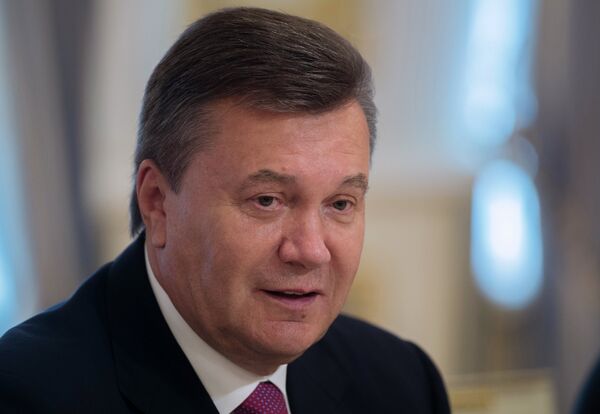KIEV, December 13 (RIA Novosti) – Ukrainian opposition leaders reiterated their demands to President Viktor Yanukovych on Friday at a roundtable designed to help soothe political tensions in the protest-hit state.
No tangible results were reached at the meeting, however.
Arseny Yatsenyuk, head of the parliament’s most influential opposition faction, Batkivshchyna (Fatherland), said the president “failed to give a definite answer to any of the demands voiced by the protesters.”
“The only thing that he vowed to do on camera is to impose a moratorium on the use of violence,” Yatsenyuk said, speaking to protesters after the talks.
Oleh Tyahnybok, head of the nationalist Svoboda party, said the only result of the meeting was that the opposition “has ultimately voiced its demands to Yanukovych in person.”
Protests in Ukraine, focused in the capital, Kiev, have been raging since the government last month pulled out of preparations to sign landmark political and trade deals with the EU, sparking widespread indignation.
The opposition said the protests would continue until next Tuesday at the earliest, when the Ukrainian president is to visit Russia.
The “Unite Ukraine” roundtable, intended to bring together the country’s leadership and the opposition for negotiations, was initiated by former President Leonid Kravchcuk, who served as the country’s first post-Soviet head of state until mid-1994.
Arseny Yatsenyuk, head of the parliament’s most influential opposition faction, Batkivshchyna (Fatherland), said ahead of the meeting that he and two fellow opposition leaders would use the encounter to lay out their demands to Yanukovych.
“We want the release of political prisoners. Second, we want the punishment of those responsible for the dispersal of peaceful demonstrations. And finally, we demand early presidential and parliamentary elections,” Yatsenyuk said, speaking from a stage on Kiev’s Independence Square.
Speaking at the meeting, he said he came to “voice the demands of those who are currently rallying on the square.” Independence Square has served as the focal point for protests since last month.
Yatsenyuk went on to say that the unrest in Ukraine would continue until all demands are met, regardless of the government’s attempts to crack down on the opposition.
“Even if you disperse one square, another will emerge immediately,” he said, adding: “We know that there are plans to put opposition leaders in prison. But even if you jail them all, others would step in.”
Yanukovych replied, speaking at the round table, that the EU agreements were rejected because they clearly contradicted Ukraine’s national interests and were a threat to the national economy. However, he assured that the country would go ahead with its European integration bid in the future.
“I would say that the work [to prepare Ukraine’s association agreement] was done badly. Moreover, it was done clearly to the detriment of Ukraine’s national interests,” the president said at the roundtable. “Those who were responsible for preparing this agreement will at best be suspended from their duties. It is possible that they will eventually be fired.”
He also vowed to impose a moratorium on any use of force against the protesters.
The president also said that three people bore personal responsibility for the use of force against the protesters, that their names would soon be made public and that they would be held liable for their actions.
Yanukovych’s predecessor, Viktor Yushchenko, said at the meeting that signing the EU accession deal by year-end was the first and the most important precondition for bringing an end to the current political crisis, with another precondition being to disband the current Cabinet of ministers.
He also called for the government to release those detained in the ongoing protests and to make sure that no force is used against protestors in the future.
World boxing champion and opposition leader Vitali Klitschko warned that any violence against anti-government protestors would have “disastrous consequences” for Yanukovych and his government.
While nationwide discontent was initially focused on the reversal of course over the EU – a move the authorities justified by stating it was necessary to boost economic ties with neighboring Russia – it has with time taken on a more generalized anti-government flavor.
The authorities have alternately signaled possible negotiation with the opposition while also occasionally attempting heavy-handed clearances of Independence Square.
In a bid to ease the growing civil discontent, Prime Minister Mykola Azarov, whose government came under increased pressure to resign, told the roundtable that he would decide on stepping down in the near future.
According to a statement released by the Batkivshchyna party, Yatsenyuk accused Azarov of being personally responsible for the unrest.
“Your personal desire to retain your office, to hang on to your [government] seat instead of simply announcing your resignation is the utmost reason for the ongoing political and economic crisis in the country,” he said.
Riot police and Interior Ministry forces clashed with opposition supporters in Kiev early Wednesday, while municipal services removed barricades that protesters put up in the streets to disrupt access to government buildings.
Police said later that they were only working to dismantle the barricades impeding traffic, not to disband the protest camp itself.
But the authorities’ attempts to clear Independence Square and the city hall building, which has also been taken over by demonstrators, were thwarted and barricades were put back in place.
In a show of reconciliation, however, Yanukovych on Friday proposed granting amnesty to people detained during mass unrest that erupted outside the presidential administration building late last month.
Russian Prime Minister Dmitry Medvedev said the Ukrainian society currently needs to overcome a “tectonic fault” that threatens “the stability in the country and the very existence of Ukraine as a sovereign state.”
He said Russia wanted “our Ukrainian friends to deal with all their problems on their own, to come to a single consensus decision and to assure that there were no attempts [on behalf of foreign nations] to interfere and to deprive Ukraine of its sovereignty.”
Updates with opposition leaders’ statements made after the meeting


